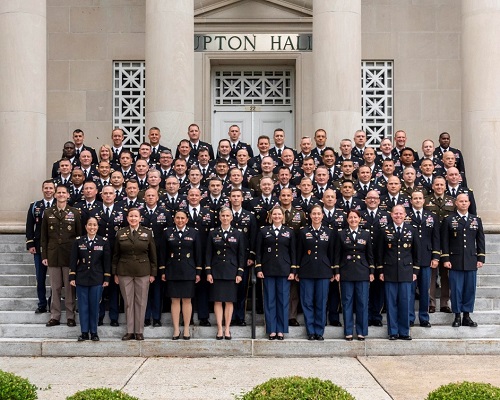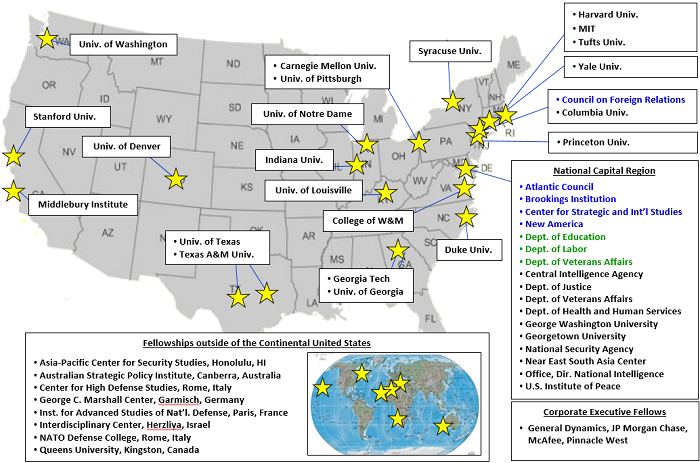Introduction
The Fellows Department is responsible for managing the Fellows Program, which consist of two cohorts:
CSA and SMA Senior Fellows are relatively senior, often post-Colonel command and senior service college graduates, and are placed in positions of influence on behalf of the senior Army leadership.

USAWC Fellows are given opportunities to study and evaluate national security policy, strategy, and operational issues to substantially enhance their ability to participate in the formulation and implementation of national security policy. Officers who successfully complete the program receive senior service college credit and experience assignment utilization similar to that of graduates of a senior service college.
The department administers three primary functions: coordination and oversight of the academic efforts of more than 75 Fellows per year, administrative support for the Fellows in residence and for those identified to serve a Fellowship in the coming year, and management of all relationships and administrative requirements with the 60+ host institutions the Fellows attend. These efforts are completed by one active Army Colonel and four Department of the Army civilians.

Click picture to enlarge
Fellows incur academic obligations similar to that of a resident senior service college student. Fellows complete papers for both the USAWC and their host institutions, are required to complete extensive outreach activities, and often serve as bridges to unique ongoing scholarship on topics of national security or in support of national security. Upon completion of all program requirements, Fellows receive military education level 1 credit but they do not receive the Masters in Strategic Studies from the USAWC and they do not typically receive a masters from their fellowship hosting institutions, unless they elect to enter into a masters program separately.
CSA and SMA Senior Fellows - Overview
- Experienced Army representatives serve with key think-tanks and academic institutions as ambassadors and strategic scouts for the senior Army leadership.
- Typically are post Colonel-level command or other key developmental positions, plus one post-Senior Service College Army Civilian.
- Senior Fellows will enhance strategic thinking, professional networks, and understanding of policymaking processes at the national level. They will contribute to the Army's outreach program by enhancing communication and appreciation for the role of Landpower and Army missions and priorities within important academic and policy-influencing institutions.
- Host institutions are: carefully selected based on their strategic focus areas, academic excellence, and resident national security professionals; and assessed each year to ensure the greatest value to the Army and the broadest professional development opportunities for each Fellow.
CSA and SMA Senior Fellows - Expectations
- The U.S. War College Fellowship Program's primary purpose is to facilitate the Senior Fellows - accomplished via an initial orientation and ongoing support in the academic, outreach/engagement, and administrative realms.
- Senior Fellows will:
- Maintain Army Staff-host institution bonds.
- Engage civilian counterparts - develop professional and personal relationships, to include relevant project teaming.
- Appreciate techniques used to articulate issues and influence strategic solutions within and outside the Federal Government.
- Provide Army senior leaders unique and timely awareness and research on Army-relevant issues at institutions key to defense and security policy formulation, and deliver to them the Army's best information and insights on those issues.
- Develop as a qualitatively enhanced strategic thinker and leader, fully prepared for follow-on duties in select and sensitive utilization assignments.
USAWC Fellows - Overview
- Officers selected for Senior Service College who are afforded the rare opportunity to study, learn, and serve as Army ambassadors in unique settings and conditions.
- Fellows experience valuable broadening through -
- Formal and informal education opportunities - in and out of the classroom
- Interaction with senior actors and future influencers on topics of strategic importance
- Unique research settings and publishing venues
- At universities, government agencies, corporations -
- National Security Fellowships provide exposure to world-class institutions
- Examples - Columbia, Georgetown, Harvard, MIT, Princeton, Stanford, Tufts, Yale
- Regional Fellowships provide strategic orientations within a multinational construct
- Examples - Asia-Pacific and Marshall Centers, NATO Defense College, UT, UW
- Specialized Fellowships focus on technical functional areas and allow Fellows to interact with the highest levels of leadership and specialists in those fields
- Examples - Carnegie Mellon, CIA, HHS, MIT, NSA, Pitt, SecDef Executive Program
USAWC Fellows - Expectations
- Fellows pursue Individual Learning Plans to satisfy USAWC Primary Learning Outcomes:
- Think critically and creatively in addressing national security issues
- Evaluate theories of war, national security policy, strategic leadership, global security and regional issues in the context of strategic decision making
- Analyze how regional, governmental, military, and private organizations processes, structures and capabilities achieve strategic objectives
- Evaluate and synthesize how domestic and foreign leaders, as well as policy makers, scholars, and dignitaries
- Make decisions in strategic environments
- Communicate clearly, persuasively, and candidly
- Understand, assess, and maintain/improve personal well being
U.S. Army War College Fellows and Resident and Distance Education Students Compared
- USAWC Fellows receive a USAWC certificate of completion. Resident and DDE Students receive a certificate plus a USAWC Master's Degree diploma. USAWC Fellows do not receive a Master's Degree.
- Resident/DDE Students receive a Masters in Strategic Studies Degree. 100% of USAWC Fellows possess at least one advanced degree before undertaking their Fellowships.
- USAWC Fellows/DDE Students do not receive JPME II credit. Resident Students do. If not joint-qualified, Fellows attend the Joint and Combined Warfighting School, before or after their USAWC year, per HRC.
- USAWC Fellows receive opportunities to learn and also conduct engagement activities, some of which are externally funded. Resident Students travel away from campus infrequently for learning or speaking opportunities.
- USAWC Fellows are often sponsored by 2, 3, and 4 star uniformed or senior civilian Senior Army Mentors for their research projects. Resident/DDE Students are not.
- Each cohort - Fellow, resident, and distance education - pursues Primary Learning Outcomes codified in Individual Learning Plans.
Contact Us